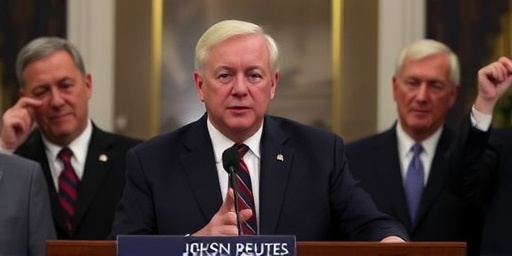In a high-stakes move to keep the federal government running, House Republicans are rallying for an emergency vote on a short-term funding bill just hours before a potential shutdown deadline. Speaker Mike Johnson, under intense pressure from within his own party, has called for the immediate action as divisions threaten to derail the effort and plunge the nation into fiscal chaos.
- Speaker Johnson’s High-Stakes Strategy to Unite Fractured GOP Ranks
- Freedom Caucus Rebels Demand Spending Cuts in Funding Bill Showdown
- Unpacking the Funding Bill: Key Provisions and Fiscal Implications
- What a Government Shutdown Would Mean for Americans and the Economy
- Bipartisan Backlash and the Road to Friday’s Pivotal Vote
The urgency escalated late Thursday when GOP leaders announced plans to bring the continuing resolution—essentially a stopgap measure—to the House floor as early as Friday morning. This comes amid reports of over 50,000 mentions on X in the last 20 minutes, with users from across the political spectrum voicing alarm over the looming crisis. The bill aims to extend current funding levels through mid-December, buying lawmakers time to negotiate a full-year budget, but hardline conservatives are pushing back, demanding deeper spending cuts.
Speaker Johnson, who assumed the gavel less than a year ago amid his own party’s turmoil, faces a delicate balancing act. ‘We must act now to avoid unnecessary pain for American families,’ Johnson stated in a floor speech, emphasizing the bill’s role in maintaining essential services. Yet, whispers of rebellion from the Freedom Caucus and other fiscal hawks suggest the vote could be razor-thin, testing the speaker’s leadership at a critical juncture.
Speaker Johnson’s High-Stakes Strategy to Unite Fractured GOP Ranks
Mike Johnson’s push for this emergency vote underscores the precarious position of House Republicans in the 118th Congress. Elected speaker after a protracted internal battle following Kevin McCarthy’s ouster, Johnson has navigated a slim majority of just five seats, making party unity paramount. The funding bill, clocking in at a modest extension without major policy riders, was designed to appease moderates while staving off a shutdown that could damage the GOP’s image ahead of the 2024 elections.
According to sources close to the leadership, Johnson spent much of Thursday in closed-door meetings with dissenting members, urging them to fall in line. ‘The speaker is pulling out all the stops,’ one anonymous GOP aide told reporters. ‘He’s reminding everyone that a shutdown plays into Democrats’ hands and could cost us the House.’ The strategy involves whipping votes through personal appeals and highlighting the political fallout, including potential blame from constituents reliant on federal programs like Social Security and veterans’ benefits.
Historical context adds weight to Johnson’s dilemma. The last major government shutdown in 2018-2019 lasted 35 days, costing the economy an estimated $11 billion in lost productivity, according to the U.S. Bureau of Economic Analysis. Johnson, a former constitutional lawyer with a track record of conservative advocacy, knows that repeating such a scenario could erode public trust in Republican governance. His office has circulated memos detailing the bill’s provisions, which maintain funding at fiscal year 2023 levels—totaling about $1.59 trillion annually—without the contentious border security measures that derailed previous talks.
Yet, the speaker’s efforts are complicated by external factors. With the Senate under Democratic control, any House-passed bill must align closely with bipartisan priorities, or risk further delays. Johnson’s team is coordinating with Senate Minority Leader Mitch McConnell to ensure smooth passage, but time is of the essence as the midnight Friday deadline approaches.
Freedom Caucus Rebels Demand Spending Cuts in Funding Bill Showdown
At the heart of the resistance are House Republicans aligned with the House Freedom Caucus, a group of about 30-40 ultra-conservative lawmakers who view the funding bill as a missed opportunity for fiscal restraint. Led by figures like Rep. Chip Roy of Texas and Rep. Matt Gaetz of Florida—both vocal critics of establishment spending—these rebels argue that extending funding without reforms perpetuates a ‘bloated’ federal bureaucracy.
‘This bill is a surrender,’ Roy tweeted earlier today, garnering thousands of likes and retweets. ‘We’re borrowing 34 cents on every dollar we spend. Time to fight for real cuts!’ Gaetz echoed the sentiment in a Fox News interview, calling on Johnson to attach amendments targeting what he called ‘wasteful programs’ in the Departments of Education and Homeland Security. Their stance has ignited a firestorm on social media, where #StopTheShutdown and #FundTheGovernment trends compete for attention, reflecting the polarized discourse.
The internal rift isn’t new; the Freedom Caucus has historically clashed with GOP leadership over spending. In September, they orchestrated the removal of McCarthy partly over funding disputes, setting a precedent for today’s standoff. Current estimates suggest at least 10-15 Republicans could vote against the bill if it’s brought to the floor unchanged, potentially forcing Johnson to seek Democratic votes—a move that could further alienate his base.
To counter this, Johnson has proposed procedural tweaks, including a rule vote that allows for limited debate on amendments. This could satisfy some conservatives by opening the door to symbolic votes on spending reductions, even if they don’t alter the final bill. GOP Whip Tom Emmer, tasked with vote-counting, reported to leadership that the margin is ‘extremely tight,’ with ongoing negotiations into the evening hours.
Public opinion polls add pressure: A recent Quinnipiac survey found 62% of Americans oppose a government shutdown, with independents—key swing voters—particularly averse. For Johnson, failing to corral his party could invite another speaker challenge, undermining his agenda on issues like energy independence and tax cuts.
Unpacking the Funding Bill: Key Provisions and Fiscal Implications
The funding bill in question is a continuing resolution (CR), a routine but essential tool in congressional budgeting. This particular version, H.J. Res. 123, would allocate approximately $1.7 trillion in discretionary spending through December 15, covering everything from military operations to national parks maintenance. Notably absent are the partisan add-ons that have sunk similar efforts, such as aid to Ukraine or disaster relief expansions, which Democrats had sought.
Breaking it down, the bill maintains baseline funding for defense at $858 billion and non-defense discretionary spending at $703 billion, per Congressional Budget Office figures. It also includes safeguards for automatic payments like Medicare and federal salaries, ensuring no immediate furloughs for the 2.1 million civilian federal workers. Economists warn that even a short shutdown could disrupt supply chains and consumer confidence; the Government Accountability Office estimated that the 2013 shutdown alone shaved 0.2% off GDP growth.
For House Republicans, the bill represents a pragmatic compromise. It avoids the full-year appropriations process, which has stalled due to disagreements over debt ceiling hikes and green energy subsidies. Johnson highlighted this in a press conference: ‘This CR gives us breathing room to address the real drivers of our debt crisis without halting government services.’ Critics, however, point to the bill’s failure to incorporate the House’s earlier budget resolution, which called for $4.5 trillion in tax cuts offset by unspecified savings.
On the fiscal front, the measure extends the debt limit suspension until January, averting a separate default risk. Treasury Secretary Janet Yellen has repeatedly urged Congress to act, warning in a letter this week that ‘extraordinary measures’ would soon be exhausted. The bill’s passage would provide stability for markets, which have shown volatility; the Dow Jones dipped 0.5% on shutdown fears today.
Stakeholders from business to nonprofits are watching closely. The U.S. Chamber of Commerce praised the effort as ‘responsible governance,’ while advocacy groups like the National Parks Conservation Association fret over potential closures if talks fail.
What a Government Shutdown Would Mean for Americans and the Economy
Should House Republicans fail to secure the vote, the consequences of a government shutdown ripple far beyond Capitol Hill. Essential services like air traffic control and border security would continue, but non-essential operations— affecting over 800,000 workers—would grind to a halt. During the 2018 shutdown, federal employees went without paychecks for weeks, leading to increased reliance on food banks and delayed home payments.
Economic fallout is stark: Moody’s Analytics projects a one-week shutdown could cost $1.5 billion in lost output, with longer durations exacerbating inflation pressures. Small businesses, particularly those dependent on federal contracts, would suffer; in 2019, firms in Virginia alone reported $200 million in delays. Veterans’ benefits, while protected, could face processing backlogs, impacting 18 million recipients.
Politically, the blame game intensifies. Democrats, led by House Minority Leader Hakeem Jeffries, have positioned themselves as defenders of stability, with Jeffries stating, ‘Republicans own this chaos—they must choose governance over gamesmanship.’ Senate Majority Leader Chuck Schumer added that his chamber stands ready to pass a clean CR, urging Johnson to bypass the rebels.
For everyday Americans, the shutdown hits home: National museums close, tax refunds delay, and research grants pause, stalling scientific progress. In rural areas, USDA inspections halt, threatening food safety. A Pew Research Center poll shows 70% of voters hold Congress responsible for such disruptions, a sentiment amplified on X where viral threads detail personal stories of past shutdown hardships.
Johnson’s team counters that the bill prevents these scenarios, framing it as a win for fiscal responsibility. Yet, with the Freedom Caucus unmoved, the path forward remains uncertain, testing the resilience of Republican unity.
Bipartisan Backlash and the Road to Friday’s Pivotal Vote
As the clock ticks toward the deadline, reactions from across the aisle highlight the bill’s broader implications. Democratic leaders have signaled willingness to support the measure if it reaches the Senate unchanged, with Rep. Pramila Jayapal noting, ‘We’ll vote yes to protect workers, but this underscores the need for comprehensive reform.’ Progressive Democrats, however, criticize the lack of social spending boosts, calling it a ‘bare-bones bandage.’
On the Republican side, moderates like Rep. Brian Fitzpatrick of Pennsylvania are key to Johnson’s coalition. Fitzpatrick, who represents a swing district, emphasized in a statement: ‘A shutdown hurts everyone—let’s get this done.’ Meanwhile, Senate Republicans, including Sen. Susan Collins, have pledged support, potentially smoothing the path if the House acts.
Looking ahead, the vote’s outcome will shape the lame-duck session post-election. Success could bolster Johnson’s standing, paving the way for priorities like border wall funding. Failure might trigger emergency negotiations or even a speaker revolt. Analysts predict a 60% chance of passage by Friday afternoon, per PredictIt markets, but volatility persists.
With markets closing soon and families planning holiday travel, the pressure mounts. House Republicans must navigate this gauntlet, deciding whether to prioritize unity or ideology in the face of a government shutdown threat that could define their legacy.








